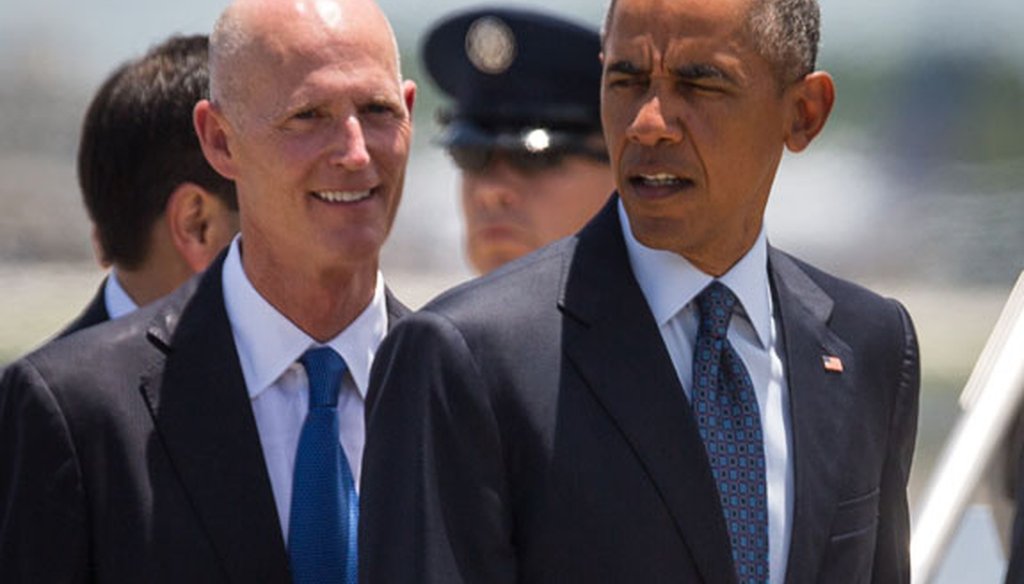Stand up for the facts!
Our only agenda is to publish the truth so you can be an informed participant in democracy.
We need your help.
I would like to contribute

Gov. Rick Scott and President Barack Obama meet at Orlando International Airport on June 16, 2016. (Tampa Bay Times photo)
In what has become a familiar political two-step, Gov. Rick Scott bashed Washington after he asked the Federal Emergency Management Agency for help but didn’t get it.
Scott specifically blamed President Barack Obama following FEMA’s refusal to declare a state of emergency in the wake of the June 12, 2016, massacre at Pulse nightclub in Orlando. Scott had asked for $5 million to deal with emergency response efforts, medical care and counseling.
"It is incredibly disappointing that the Obama Administration denied our request for an Emergency Declaration," Scott said in a June 20 press release. "Last week, a terrorist killed 49 people, and wounded many others, which was the deadliest shooting in U.S. history. It is unthinkable that President Obama does not define this as an emergency."
He included a list of situations that FEMA has declared a state of emergency, including the 2013 Boston Marathon bombing, the Flint water crisis and a 2009 order for Obama’s inauguration.
In typical rejection verbiage, FEMA administrator W. Craig Fugate wrote in a letter that Scott’s request "did not demonstrate how the emergency response associated with this situation is beyond the capability of the state and affected local government or identify any direct federal assistance needed to save lives or protect property."
Fugate for years was director of the Florida Department of Emergency Management under former Gov. Jeb Bush, including during seven hurricanes over 2004-05.
Scott’s office told us Scott plans to appeal the denial.
His disappointment in FEMA’s rejection isn’t really a fact we can check, but it does highlight Scott’s record of not getting what he wants from the agency.
While he routinely criticizes Obama’s policies and Washington spending, records show Scott has asked for federal money from the agency 10 times since taking office in 2011. FEMA, meanwhile, has denied his requests six times, a far higher rejection rate than the national average.
The biggest issue with asking FEMA for help after the Orlando shooting is that the agency doesn’t deal with terrorist attacks in such a manner, FEMA spokesman Rafael Lemaitre said. Other states have not asked for emergency declarations after past mass shootings.
"The only instance in which this administration has received a terrorist-related request for a federal state of emergency was the Boston marathon bombing, which was an ongoing incident at the time of the request," Lemaitre told PolitiFact Florida. "It is extremely uncommon to make a specific request like this for an event that is not ongoing."
Lemaitre pointed out that FEMA did approve a state request to use up to $253,000 in unused Homeland Security grant money to pay for overtime for Orlando responders. The federal government also has provided millions in funding for resources and training for terrorist attacks to the Orlando area prior to the nightclub shooting, he said. U.S. Attorney General Loretta Lynch announced June 21 that the Department of Justice would be providing another $1 million for overtime costs.
The Stafford Act sets the process for states to ask the president for help in the event of a catastrophe. A declaration allows FEMA to provide financial and physical assistance to the state.
There are two types of declarations for which a governor can ask: emergency declarations, such as the one Scott made for Orlando, and major disaster declarations.
Lemaitre said emergency declarations are to help save lives and property immediately before or after a disaster occurs. This type of declaration provides up to $5 million for certain types of aid, like generators or national guard evacuations.
According to FEMA records, Scott has only made one other emergency declaration request, after severe storms affected some Panhandle counties between Feb. 15-24, 2016. The request was denied in part because FEMA typically limits responses to single storm systems, or storms within 72 hours of each other.
While both of Scott’s emergency requests have been rejected, FEMA typically grants them nationwide. The latest records the agency provided showed that out of 66 requests since 2011 (if we include Orlando), only five have been denied — including Scott’s request for Orlando. That’s a rejection rate of about 7 percent.
Most of the approved emergency declarations were to help with storms, fires or floods. Twelve of those granted requests came from mid-Atlantic or New England states hit by Hurricane Sandy in 2012. Another 14 cases were from Hurricane Irene in 2011.
The other type of declaration is for major disasters. This relief is focused on recovery support for events that state and local governments can’t handle on their own. Lemaitre said that includes rebuilding roads and bridges, or helping people find temporary housing.
Scott’s record is far below average on this count as well. He’s made eight such requests since 2011, and four of them have been denied (one of the refusals involved the same Panhandle storms for which he had requested an emergency declaration). Nationwide, FEMA has approved about 85 percent of almost 400 disaster declaration requests in the same time frame.
Scott has registered similar displeasure in past denials, too. When FEMA didn’t grant a disaster request for flooding in the Tampa Bay area in 2015, he said through a spokeswoman that "it's disappointing that the Obama administration denied our request for federal assistance for those impacted by recent floods in the Tampa and west-central Florida areas."
Scott also said Obama was flat-out "wrong" to initially deny a 2012 disaster declaration request for relief after Hurricane Isaac. FEMA eventually approved the request upon appeal.
Given Scott’s outspoken disdain for the Obama administration, it’s tempting to think perhaps Washington is playing partisan politics with Tallahassee. A 2013 analysis by the Pew Charitable Trusts found that denials were often very close calls by the president, and usually hinged on whether a state had the infrastructure to handle catastrophes. A U.S. General Accounting Office from 2012 said that FEMA actually leaned heavily — perhaps too heavily — on per capita damage assessments to make such decisions.
FEMA’s Lemaitre said Florida’s experience responding to hurricanes makes the state better equipped to deal with problems than most locations. The state’s prosperity, which Scott so often touts, is precisely the reason emergencies don’t often qualify for help.
"The state of Florida is the fourth-largest state in the nation with a population of almost 20 million people," Lemaitre said. "The state has robust capability to respond to emergencies and disasters."
Our Sources
U.S. Government Accountability Office, "Federal Disaster Assistance: Improved Criteria Needed to Assess a Jurisdiction’s Capability to Respond and Recover on Its Own," September 2012
Tampa Bay Times, "Feds turn tables on Florida Gov. Rick Scott, deny storm money," Sept. 21, 2012
Huffington Post, "FEMA Pulls Swap On Rick Scott, Denies Florida Federal Funds," Sept. 24, 2012
Naples Daily News, "Gov. Scott asks FEMA to reconsider assistance to Collier and 10 other Fla. counties damaged by Isaac," Sept. 28, 2012
Federal Emergency Management Agency, "Robert T. Stafford Disaster Relief and Emergency Assistance Act, as Amended," April 2013
Pew Charitable Trusts, "Disaster Declaration Denials Exasperate Governors," Aug. 23, 2013
Gov. Rick Scott, Letter to President Barack Obama, May 5, 2014
WCTV, "Gov. Rick Scott Announces Federal Approval For Disaster Declaration," May 6, 2014
Congressional Research Service, "FEMA’s Disaster Declaration Process: A Primer," Nov. 12, 2014
Tampa Bay Times, "President Obama rejects Gov. Rick Scott's plea for federal disaster declaration from Tampa Bay flooding," Sept. 3, 2015
Federal Emergency Management Agency, Letter to Gov. Rick Scott, March 25, 2016
Pensacola News Journal, "Escambia tornado victims denied FEMA help," March 26, 2016
Tampa Bay Times Buzz blog, "Gov. Rick Scott requests emergency declaration from President Obama over Orlando shootings," June 13, 2016
Tampa Bay Times, "Deep rift between Gov. Rick Scott and President Obama looms larger," June 14, 2016
Gov. Rick Scott, "Gov. Scott: FDLE and DCF providing funds to help with Orlando terror attack," June 15, 2016
Gov. Rick Scott, "Governor Scott: DOJ Approves Funding for FDLE to Help with Orlando Terror Attack," June 17, 2016
Orlando Sentinel, "FEMA denies request for emergency declaration following Pulse shooting," June 20, 2016
Federal Emergency Management Agency, Letter to Gov. Rick Scott, June 20, 2016
Gov. Rick Scott, "Gov. Scott: Disappointing the Obama Administration denied request for emergency declaration following terror attack," June 20, 2016,
Orlando Sentinel, "Lynch: We're providing $1M for nightclub shooting OT," June 21, 2016
Federal Emergency Management Agency, Emergency declarations 2011-2016, accessed June 23, 2016
Federal Emergency Management Agency, "Preliminary Damage Assessment Reports," accessed June 23, 2016
Federal Emergency Management Agency, "The Disaster Declaration Process," accessed June 23, 2016
Interview with Rafael Lemaitre, FEMA spokesman, June 23, 2016
Interview with Lauren Schenone, Scott spokeswoman, June 23-24, 2016






























